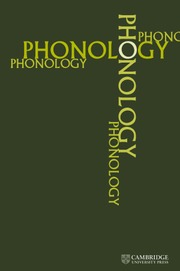The binarity effect in Kosraean reduplication
Published online by Cambridge University Press: 14 November 2005
Abstract
This paper offers a formal analysis of prefixing and suffixing reduplication in Kosraean. The prosodic shape of each affix is sensitive to the form of the stem, giving rise to multiple prosodic variants. In particular, its prefix illustrates the binarity effect, in which the reduplicant is binary if and only if the base is binary. Curiously, the suffix is not subject to the same generalisation, but still follows from the same formal analysis. Both affixes also show additional curious effects of vowel-initial stems. Using an optimality-theoretic approach, I will show that the prosody of both affixes is a function of the prosodic structure of the whole word rather than of a requirement that the affix fill a specified prosodic template. The analysis makes the binarity effect an example of a contextually weight-sensitive language, in which closed syllables are bimoraic only under certain morphological circumstances.
- Type
- Research Article
- Information
- Copyright
- 2005 Cambridge University Press
Footnotes
- 6
- Cited by


